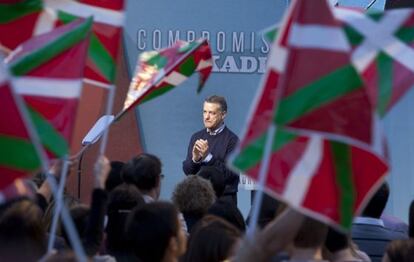Basque leaders play cagey game in shadow of Catalan sovereignty push
Non-nationalist parties try to draw out PNV candidate on post-election plans

With 10 days left before residents in the Basque Country go to the polls to elect a new parliament and regional leader, voter focus in recent weeks has been shifted to Catalonia where a growing separatist drive is taking shape. It is a movement that many pro-Basque independence groups hope could help them easily define their own breakaway quest in the future.
Never has there been an election in Euskadi where voters are turning their attention to events taking place outside their own region. The Basque Nationalist Party (PNV) of Iñigo Urkullu is confident that it will win the October 21 race -- as was suggested by a recent Center for Sociological Research (CIS) poll -- with sufficient seats to form a government through a pact with EH-Bildu, the abertzale nationalist left's recently formed coalition.
The partnership between the Basque Socialists (PSE) and the Popular Party (PP), which has allowed for Socialist Patxi López to govern since May 2009, fell apart earlier this year. But while both the PSE and the PP still concur that they need to mobilize their support by alerting voters to the political, economic and social dangers and consequences of a renewed push for independence -- not only for the region, but for the entire country -- their two respective leaders, López and Antonio Basagoiti, are going about it by embarking on different strategies.
The CIS survey released last Friday shows that the PNV could take a majority 27 seats in the 75-seat parliament. EH-Bildu would become the second force with 21-22 seats. The Socialists and PP would get 14, and nine to 10 respectively, while the United Left (IU) would win three seats.
According to one Basque Socialist lawmaker, both his party and the PP are well aware that the PNV and EH Bildu have been mobilizing their electorate, tapping the excitement from the fast pace of events in Catalonia where separatist forces, especially among the ruling Catalan nationalist CiU bloc, are gearing up for a referendum to be held as early as next year. "Our people are starting to worry more," said a Socialist source.
Mas goes to the heart of the matter while Urkullu takes a lukewarm stance"
The PP has gone on the attack, warning its constituents about secret plans the PNV and Bildu have made to get the separatist ball rolling as soon as they take their seats in the new regional parliament. This warning was made in May during the conservative party's regional convention, when voters reelected Basagoiti as their leader.
The defiance of Catalan premier Artur Mas, who has said he plans to hold a referendum and embark on new policies for a "self-sufficient state," has made it easier for the PP in the Basque Country to use the cause for national unity as a rallying point. But it has also allowed the PP, for now, to divert attention away from other issues in the campaign such as the national administration's cutbacks and austerity measures.
"The PNV and the CiU have always had the same parallel strategies, and now we are convinced about their similarities, even though one [Mas] goes to the heart of the matter while the other [Urkullu] prefers a lukewarm position as an electoral strategy," said one key member of the Basque PP. For his part, Basagoiti described Basque and Catalan nationalism "as two coins with the same face" on Wednesday during a breakfast meeting with journalists in Madrid.
But the Socialists are purposely avoiding drawing comparisons between Urkullu and Mas when it comes to the separatism issue. "We don't need to get anyone all riled up. Neither do we want to start creating more nationalists, which may happen if the PP continues with its exaggerated discourse. But yes, we need to address this," said one leading Socialist candidate in the Basque Country.
Even before the massive Catalan march in support of independence that took place on September 11, Basque regional premier López had claimed that Urkullu was adopting a stronger pro-sovereignty stance. But he also argued that it would not be so easy to magnify separatist sentiment in the Basque Country, as López had not tightened spending and made the same social cutbacks as Mas was forced to do in his own region. Yet both the PSE and PP agree on one strategy: to force Urkullu to clarify his plans on the separatist issue before the election, but party members on both sides are not counting on that happening.
Tu suscripción se está usando en otro dispositivo
¿Quieres añadir otro usuario a tu suscripción?
Si continúas leyendo en este dispositivo, no se podrá leer en el otro.
FlechaTu suscripción se está usando en otro dispositivo y solo puedes acceder a EL PAÍS desde un dispositivo a la vez.
Si quieres compartir tu cuenta, cambia tu suscripción a la modalidad Premium, así podrás añadir otro usuario. Cada uno accederá con su propia cuenta de email, lo que os permitirá personalizar vuestra experiencia en EL PAÍS.
¿Tienes una suscripción de empresa? Accede aquí para contratar más cuentas.
En el caso de no saber quién está usando tu cuenta, te recomendamos cambiar tu contraseña aquí.
Si decides continuar compartiendo tu cuenta, este mensaje se mostrará en tu dispositivo y en el de la otra persona que está usando tu cuenta de forma indefinida, afectando a tu experiencia de lectura. Puedes consultar aquí los términos y condiciones de la suscripción digital.









































